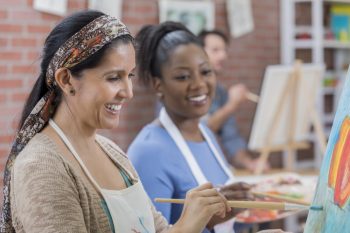Home / Health & Wellness Articles / Mental Health /
Using Art to Improve Mental Well-Being

When navigating life’s toughest moments, many people turn to familiar coping strategies such as talking with a trusted friend or family member, exercising, practicing deep breathing, or even seeking therapy. But there’s one powerful tool that often gets overlooked: art therapy.
Art therapy is a unique approach to channel inner feelings, emotions, stress, and trauma through mediums such as painting, sculpting, poetry, creative writing, music, and photography. The use of art as a form of therapy can help build self-awareness and coping skills, increase self-esteem and confidence, improve cognitive and motor function, reduce stress, and strengthen communication and social skills.
Centerstone’s Peer Support Services offers various creative activities, including participation in the Healing Arts Project, Inc., (HAPI), a nonprofit organization providing opportunities for people with mental health concerns and addiction recovery to promote healing, community awareness, and inclusion. Centerstone’s peer support activities help create a safe and inclusive environment where individuals with mental health challenges or substance use disorders can work toward goals with other peers while participating in learning and leisure activities.
Some of these activities include art contests, visiting art museums and art shows, decorating facilities with client art, professional art instruction, and the opportunity to sell art pieces through HAPI. The overall goal for those who utilize art as a form of therapy is to grow by gaining confidence and developing future skills that will aid mental health concerns or substance use disorders.
It is important to understand that some people may not benefit from traditional therapy, and that is why they are encouraged to explore options that might better suit them. If you question the impact of traditional therapy, here are some of the benefits of finding a creative outlet such as art therapy:
- Alleviates symptoms. Taking the time to focus on art might help ease your anxiety, depression, and stress. Practicing art and channeling your emotions can help to alleviate some of your symptoms and increase development in positive coping skills and art techniques.
- Increases confidence. For some clients, it might be more difficult to vocalize their feelings or even be vocal at all, and art is another way to express feelings. Another reason for creating art is the reward of seeing it displayed—seeing your own work complete and displayed can boost confidence.
- Social connection. One of the great things about Centerstone’s Peer Support Services and other similar programs is that you can create art individually or in a group. Regardless of your preferred method, you get to meet other individuals, create lasting, supportive friendships, and learn from professionals about different art techniques.
- Enhances focus. Most of the time when we are so enveloped by creating things like art, we lose track of time and are beginning to enhance our focus skills with our artwork. This type of focus is good for us when we are trying to relax and find peace within ourselves and just enjoy creating art.
If you find yourself trying to cope with difficult emotions, and traditional forms of therapy haven’t given you the result you are looking for, ask a mental health professional about art as means to recovery. They can provide more tools on how to manage your mental health challenges and other tips for coping.
Benjamin Overby is a Peer Support Services Team Lead at Centerstone, a nonprofit health system specializing in mental health and substance use disorder services.


